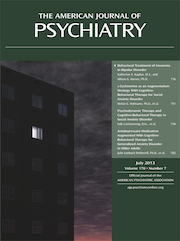T
o the E
ditor: Dronabinol is a synthetically produced oral delta-9-tetrahydrocannabinol (THC), the primary naturally occurring psychoactive constituent of cannabis. It is approved in the United States for the treatment of chemotherapy-induced nausea and vomiting and AIDS-associated anorexia and weight loss, but it has been used off-label for treatment of other conditions, including non-AIDS-related anorexia and weight loss (
1). Like cannabis, dronabinol’s tolerance, withdrawal, and psychoactive properties are mediated through the CB
1 receptor (
1–
4). Common symptoms of cannabinoid withdrawal include irritability, anxiety, decreased appetite or weight loss, restlessness, and sleep difficulties, including strange dreams. Less common symptoms include chills, depressed mood, stomach pain, shakiness, and sweating. The onset of withdrawal is within 24 hours of abstinence, peaks within 2–3 days, and lasts approximately 1–2 weeks. To date, withdrawal has only been described in animals and oral cannibinoid users in research studies. Here we describe the first case, to our knowledge, in a clinical setting.
Case Report
“Ms. A,” a 71-year-old woman with a history of anxiety and postmyocardial infarction depression, was hospitalized for ischemic bowel and failure to thrive. Upon consultation, she was treated with duloxetine, methylphenidate, and supportive therapy, and her depressive symptoms gradually improved. Weeks later, she developed acute worsening of her mood, anxiety, sleep, appetite, nausea, and stomach pain, as well as visual hallucinations, tremors, and diaphoresis. Dronabinol, 10 mg b.i.d., which she had been taking for 3 months, and methylphenidate, 5 mg/day, had been abruptly stopped 3–4 days earlier for perceived ineffectiveness in improving appetite. Metoclopramide had also been discontinued because of its potential for tardive dyskinesia. Dronabinol withdrawal was suspected, and the drug was reinitiated at 5 mg b.i.d. along with quetiapine, 25 mg/day, for hallucinations and possible delirium. Over the next 2–6 days, all of the symptoms returned to recent baseline measurements, and the quetiapine was quickly tapered and discontinued without recurrence of symptoms.
Discussion
We attribute the onset and resolution of symptoms to the removal and addition of dronabinol because of their quick disappearance after reinitiation and their continued absence after discontinuing quetiapine. We recommend that potential withdrawal symptoms be considered during dronabinol use; tapering during discontinuation could prevent its occurrence. Additional studies are needed to better elucidate the details of phenomena such as the frequency of occurrence and dose-dependency in this population.

